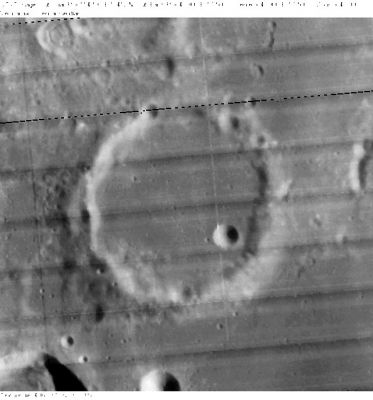Difference between revisions of "Cook"
| Line 6: | Line 6: | ||
|} | |} | ||
<div id="toc"> | <div id="toc"> | ||
| − | [http://www.lpod.org/coppermine/albums/userpics/Cook_LO-IV-060_LTVT.JPG [[Image: | + | [http://www.lpod.org/coppermine/albums/userpics/Cook_LO-IV-060_LTVT.JPG [[Image:Normal_Cook_LO-IV-060_LTVT.JPG|external image normal_Cook_LO-IV-060_LTVT.JPG]]]<br /> ''[http://lpod.org/coppermine/displayimage.php?pos=-2562 LO-IV-060]'' The 6-km crater on the floor is '''Cook A'''. The craters partially visible along the lower margin are 36-km [[Monge|Monge]] and 9-km '''Cook G'''.<br /> <br /> |
==Images== | ==Images== | ||
[http://www.lpod.org/coppermine/thumbnails.php?album=search&type=full&search=Cook LPOD Photo Gallery] [http://www.lpi.usra.edu/resources/lunar_orbiter/bin/srch_nam.shtml?Cook%7C0 Lunar Orbiter Images] [http://www.lpi.usra.edu/resources/apollo/search/feature/?feature=Cook Apollo Images]<br /> - Although there seem to be no orbital Apollo photographs in the LPI's list for '''Cook''', there are several of Apollo 16's south looking ''Fairchild''-camera frames which show the dark floor of that crater! One of those frames is [http://www.lpi.usra.edu/resources/apollo/frame/?AS16-M-0676 AS16-M-0676], which shows '''Cook''' near the central part of the curved horizon. In this frame, '''Cook''' is the crater with the small bright bowl-shaped craterlet on its floor.<br /> Research: Danny Caes.<br /> <br /> | [http://www.lpod.org/coppermine/thumbnails.php?album=search&type=full&search=Cook LPOD Photo Gallery] [http://www.lpi.usra.edu/resources/lunar_orbiter/bin/srch_nam.shtml?Cook%7C0 Lunar Orbiter Images] [http://www.lpi.usra.edu/resources/apollo/search/feature/?feature=Cook Apollo Images]<br /> - Although there seem to be no orbital Apollo photographs in the LPI's list for '''Cook''', there are several of Apollo 16's south looking ''Fairchild''-camera frames which show the dark floor of that crater! One of those frames is [http://www.lpi.usra.edu/resources/apollo/frame/?AS16-M-0676 AS16-M-0676], which shows '''Cook''' near the central part of the curved horizon. In this frame, '''Cook''' is the crater with the small bright bowl-shaped craterlet on its floor.<br /> Research: Danny Caes.<br /> <br /> | ||
| Line 14: | Line 14: | ||
<br /> | <br /> | ||
==Description: Elger== | ==Description: Elger== | ||
| − | ''([[IAU% | + | ''([[IAU%20directions|IAU Directions]])'' COOK.--A ring-plain, about 25 miles in diameter, on the W. side of the Mare Foecunditatis in S. lat. 17 deg., with low and (except on the S.W.) very narrow walls. There is a small circular depression on the S. border, and a prominent crater on the E. side of the dark interior. On the S.S.W. is the curiously shaped enclosure Cook <u>d</u>, with very bright broad lofty walls and a fine central mountain. On the plain E. of Cook is a conspicuous crater-row, consisting of six or seven craters, diminishing in size in both directions from the centre.<br /> <br /> |
==Description: Wikipedia== | ==Description: Wikipedia== | ||
[http://en.wikipedia.org/wiki/Cook_(crater) Cook]<br /> <br /> | [http://en.wikipedia.org/wiki/Cook_(crater) Cook]<br /> <br /> | ||
==Additional Information== | ==Additional Information== | ||
| − | Depth data from [[Kurt%20Fisher% | + | Depth data from [[Kurt%20Fisher%20Crater%20Depths|Kurt Fisher database]]<br /> |
* Westfall, 2000: 1.12 km | * Westfall, 2000: 1.12 km | ||
* Viscardy, 1985: 1.2 km | * Viscardy, 1985: 1.2 km | ||
Latest revision as of 01:45, 16 April 2018
Contents
Cook
|
Lat: 17.5°S, Long: 48.9°E, Diam: 46 km, Depth: 1.12 km, Rükl: 59 |
LO-IV-060 The 6-km crater on the floor is Cook A. The craters partially visible along the lower margin are 36-km Monge and 9-km Cook G.
Images
LPOD Photo Gallery Lunar Orbiter Images Apollo Images
- Although there seem to be no orbital Apollo photographs in the LPI's list for Cook, there are several of Apollo 16's south looking Fairchild-camera frames which show the dark floor of that crater! One of those frames is AS16-M-0676, which shows Cook near the central part of the curved horizon. In this frame, Cook is the crater with the small bright bowl-shaped craterlet on its floor.
Research: Danny Caes.
Maps
(LAC zone 97B2) LAC map Geologic map
Description
Description: Elger
(IAU Directions) COOK.--A ring-plain, about 25 miles in diameter, on the W. side of the Mare Foecunditatis in S. lat. 17 deg., with low and (except on the S.W.) very narrow walls. There is a small circular depression on the S. border, and a prominent crater on the E. side of the dark interior. On the S.S.W. is the curiously shaped enclosure Cook d, with very bright broad lofty walls and a fine central mountain. On the plain E. of Cook is a conspicuous crater-row, consisting of six or seven craters, diminishing in size in both directions from the centre.
Description: Wikipedia
Additional Information
Depth data from Kurt Fisher database
- Westfall, 2000: 1.12 km
- Viscardy, 1985: 1.2 km
- Cherrington, 1969: 1.15 km
- Satellite craters Cook B and F are on the ALPO list of bright ray craters.
Nomenclature
James; British explorer (1728-1779).
The name Cook was not included on the corresponding LAC map (LAC 97) of the Clementine Atlas of the Moon.- DannyCaes Aug 15, 2010
LPOD Articles
Bibliography
